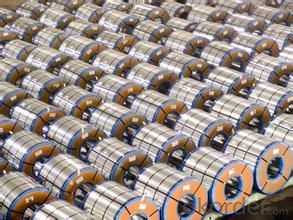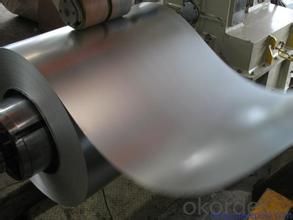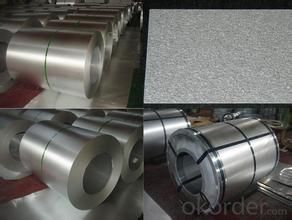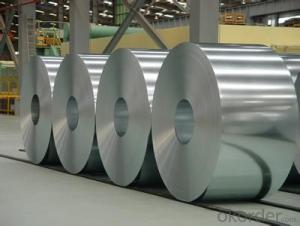Hot-dip Aluzinc Steel Building Roof Walls With Good Price
- Loading Port:
- China main port
- Payment Terms:
- TT OR LC
- Min Order Qty:
- 50 m.t.
- Supply Capability:
- 10000 m.t./month
OKorder Service Pledge
OKorder Financial Service
You Might Also Like
Hot-dip Aluzinc Steel Building Roof Walls With Good Price
1. Description of the Hot-dip Aluzinc Steel:
Hot-dip aluzinc steel structure is composed of aluminum-zinc alloy, consisting of 55% aluminum, 43% zinc and 2% at 600 ℃ silicon solidification temperature and composition, the entire structure is made of aluminum - iron - silicon - zinc, to form a dense quaternary crystals an alloy.
Hot-dip aluzinc steel has many excellent features: strong corrosion resistance, is three times the pure galvanized sheet; zinc surface with beautiful flowers, can be used as a building outside board.
Applications of hot-dip aluzinc steel:
1)Building: roof, walls, garages, soundproof walls, pipes and modular housing.
2)Automotive: muffler, exhaust pipes, wiper accessories, fuel tank, truck boxes, etc.
3)Appliances: refrigerator back, gas stove, air conditioners, microwave oven, LCD frame, 4)CRT-proof band, LED backlight, electrical cabinets, etc.
5)Farm: barn, sheds, silos, piping and other greenhouse.
6)Other: breaking heat insulation cover, heat exchangers, dryers, warm water, etc.
2.Main Features of the Hot-dip Aluzinc Steel:
• Excellent corrosion resistance
• High temperature oxidation resistance
• High hot reflectance
• Good manufacturability
•Beautiful appearance
•Surface coating
•Cost-effective
3.Hot-dip Aluzinc Steel Images



4.Hot-dip Aluzinc Steel Specification
AVAILABLE SPECIFICATION
HOT-DIP ALUZINC STEEL COILS | |
THICKNESS | 0.16mm-3.5mm |
WIDTH | 1250mm MAX |
COATING MASS | 30g/ m2-185 g/ m2 |
SPANGLE | Regular Spangle, Minimized Spangle, Zero Spangle |
SURFACE TREATMENT | Chromated / non-chromated, Oiled / non-oiled, Anti Finger Print |
COIL INNER DIAMETER | 508mm or 610mm |
HOT-DIP ALUZINC STEEL COILS | |||
COMMERCIAL QUALITY | ASTM A792M-06a | EN10327-2004 | JIS G 3321:2010 |
STRUCTURE STEEL | SS GRADE 230 SS GRADE 255 SS GRADE 275 SS GRADE 340 SS GRADE 550 | S220GD+AZ S250GD+AZ S280GD+AZ S320GD+AZ S350GD+AZ S550GD+AZ | SGLC400 SGLC440 SGLC490 SGLC570 |
5.FAQ of Hot-dip Aluzinc Steel
We have organized several common questions for our clients,may help you sincerely:
1.What advantages does your company have?
Cement : Annual capacity of 400 million tons, No. 1 in the world
Fiberglass: Annual capacity of 1 million tons fiberglass, No. 1 in the world.
Composite Materials — Carbon Fiber: Annual capacity of 10,000 tons PAN precursor and 4,000 tons carbon fiber, No. 1 in China
Composite Materials — Rotor Blade: Annual production capacity of 15,000 pieces, No.1 in China, Top3 worldwide
Glass: CNBM owns about 20 modern float glass product`ion lines, With annual capacity of 10 million square meters glass.
Light Weight Building Materials: Annual capacity of 1.65 billion square meters of gypsum board, No. 1 in the world.
Commercial concrete: Annual capacity of 0.35 billion cubic meters, No. 1 in the world.
Refractory Material: Annual capacity of 40,000 tons casting refractory, No.1 in the world.
2.What advantages do your products have?
Firstly, our base material is of high quality, Their performance is in smooth and flat surface,no edge wave ,good flexibility.
Secondly, high quality zinc ingoats, 97.5% zinc,1.5% silicon,1% others, the same zinc coating measured by metal coating thickness or by zinc weight
Thirdly, high precision: Tolerance strictly according to ASTM or JISG standard even more rigid.
We have full stes of testing equipment(for t best, cupule,chromatism,salt spray resistance, etc) and professional engineers.
- Q:What are the dimensions of steel coils used in the pipeline industry?
- The specific application and requirements play a significant role in the variation of dimensions for steel coils utilized in the pipeline industry. Generally, the dimensions for steel coils used in this industry fall within the range of 0.5 to 3.0 inches in thickness and 24 to 60 inches in width. The length of the coils can also vary, with standard lengths typically falling between 100 and 200 feet. These dimensions are carefully chosen to ensure the necessary strength and durability for pipeline construction and the transportation of various fluids and gases. It is crucial to acknowledge that these dimensions may differ depending on the project's specifics and the standards set by the industry.
- Q:I have a white gold engagement ring, and to be special I thought I'd get a plain band from Tiffany's--in stainless steel. Can stainless steel be worn with white gold or will there be a difference in the color or texture? I'm not planning on getting them soldered together, but I don't want it to be noticeable that they are different metals. Does anyone have experience in this subject?
- I didn't know Tiffany's sold stainless steel rings. I think the colour might match, but the texture wouldn't really (from looking at all the stainless steel around my kitchen. The only way to know for sure is to go to Tiffany's and try it on with your ring. Why not consider a white gold band from Tiffany's? I don't know what the price difference would be on that. But you can get a white gold for around $250 from TCo.
- Q:How do steel coils contribute to energy efficiency in appliances?
- There are several ways in which steel coils enhance energy efficiency in appliances. First and foremost, steel coils are extensively utilized in the heat exchangers of appliances like refrigerators, air conditioners, and water heaters. These coils effectively transfer heat, enabling appliances to cool or heat the desired space using less energy. By maximizing heat transfer, steel coils aid appliances in reaching the desired temperature faster and maintaining it with minimal energy consumption. Additionally, steel coils are commonly employed in the heating elements of appliances such as stoves and ovens. These coils directly provide heat for cooking or baking food. Steel's exceptional thermal conductivity ensures the even distribution of heat, reducing both cooking time and energy usage. This enables appliances to operate more efficiently, resulting in time and energy savings. Moreover, the durability and longevity of steel coils contribute to energy efficiency in appliances. Appliances equipped with steel coils are designed to withstand high temperatures and frequent usage. Consequently, they require less maintenance and replacement, reducing the consumption of resources needed to manufacture new appliances. By diminishing waste and conserving resources, steel coils indirectly promote energy efficiency and sustainability. Lastly, steel is a recyclable material. When appliances reach the end of their life cycle, the steel coils can be recycled and utilized in the production of new products. Recycling steel diminishes the necessity for extracting raw materials and conserves energy that would otherwise be utilized in the manufacturing process. This fosters energy efficiency and diminishes the environmental impact of appliances. In conclusion, steel coils contribute to the energy efficiency of appliances by optimizing heat transfer, reducing cooking time, promoting durability, and facilitating recycling. These factors collectively enhance the operational efficiency of appliances, conserve energy, and contribute to a more sustainable future.
- Q:How are steel coils processed for further use?
- Steel coils are processed for further use through a series of steps that include uncoiling, leveling, cutting, and sometimes additional treatments such as galvanizing or painting. These processes ensure that the steel coils are prepared and ready to be used in various industries such as automotive, construction, or manufacturing.
- Q:How are steel coils used in the oil and gas industry?
- Steel coils are used in the oil and gas industry for various purposes such as storage, transportation, and processing of oil and gas products. These coils are commonly used in the construction of pipelines, tanks, and equipment due to their strength, durability, and resistance to corrosion. They are also utilized in the production of offshore platforms and drilling rigs. Overall, steel coils play a crucial role in ensuring the efficient and safe extraction, transportation, and processing of oil and gas resources.
- Q:Cold rolled steel coil steel, what is the difference?
- Cold: hot rolled steel coil as raw material by pickling descaling after cold rolling, the finished rolling hard volumes, due to continuous deformation caused by cold hardening the volume rolling hard strength, hardness, toughness index rise decline, so the stamping performance will deteriorate, only for a simple deformation of parts. Rolled hard rolls can be used as raw material for hot galvanizing plants. Because the hot galvanizing units are equipped with annealing lines, the steel coils are rolled continuously at room temperature. Its strength is very high, but toughness, weldability is slightly worse, bright surface, not easy to corrosion, in order to prevent rust, the factory surface is coated with a protective layer of oil (hot rolling did not). Because of the complexity of the process, the price is higher.
- Q:What are the common manufacturing defects in steel coils?
- There are several common manufacturing defects that can occur in steel coils, including surface imperfections such as scratches, pits, or dents, dimensional inconsistencies such as uneven thickness or width, edge defects like burrs or cracks, and internal defects such as inclusions or voids. These defects can impact the quality and performance of the steel coils, and manufacturers strive to minimize these issues through quality control measures and inspections.
- Q:How are steel coils used in the production of appliances?
- Steel coils are used in the production of appliances as a primary material for constructing the various components, such as the outer shells, frames, and internal structures. The coils are processed and shaped into specific sizes and forms to meet the requirements of different appliances. Additionally, steel coils provide strength, durability, and a sleek appearance to the finished appliances.
- Q:Can steel coils be customized in terms of size and shape?
- Yes, steel coils can be customized in terms of size and shape. They can be manufactured to specific dimensions and configurations according to the requirements and specifications of the customer.
- Q:Steel or stainless steel
- Steel often has impurities that can generate fumes, which cause a fever identical to smoke inhalation. You always need to be concerned about what you are breathing around hot metal.
1. Manufacturer Overview |
|
|---|---|
| Location | |
| Year Established | |
| Annual Output Value | |
| Main Markets | |
| Company Certifications | |
2. Manufacturer Certificates |
|
|---|---|
| a) Certification Name | |
| Range | |
| Reference | |
| Validity Period | |
3. Manufacturer Capability |
|
|---|---|
| a)Trade Capacity | |
| Nearest Port | |
| Export Percentage | |
| No.of Employees in Trade Department | |
| Language Spoken: | |
| b)Factory Information | |
| Factory Size: | |
| No. of Production Lines | |
| Contract Manufacturing | |
| Product Price Range | |
Send your message to us
Hot-dip Aluzinc Steel Building Roof Walls With Good Price
- Loading Port:
- China main port
- Payment Terms:
- TT OR LC
- Min Order Qty:
- 50 m.t.
- Supply Capability:
- 10000 m.t./month
OKorder Service Pledge
OKorder Financial Service
Similar products
New products
Hot products
Hot Searches
Related keywords






























